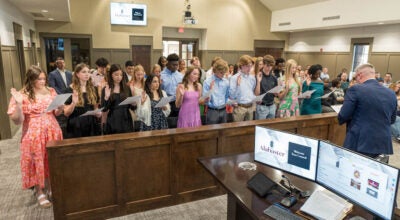State Superintendent discusses advancing education
Published 3:18 pm Wednesday, June 24, 2009
Alabama schools can rise to the top of education faster than some believe, said State Superintendent of Education Joe Morton at the Greater Shelby Chamber of Commerce luncheon June 24.
Morton served as guest speaker of the event, which also featured the chamber’s Teacher Intern Program.
The TIP program places teachers with business matching the subjects they teach. Teachers used the opportunity to discover what their students need to learn to enter the particular field.
“You get it. You see the connection between economic development and education,” Morton said. “We have to give students the tools that allow them to be competitive with students from around the world.”
Shelby County Superintendent Randy Fuller said schools must embrace new advancements to keep up. When school opens this August, Fuller expects his system to rank as the fourth largest in the state.
Fuller said collaboration is key to success.
“Our students are the most valuable resource,” Fuller said. “We must spend time and money to invest in them.”
Morton said efforts have already made an impact. Alabama fourth graders, for example, raised their reading test scores by eight points in two years.
In 2005, Alabama students scored 12 points below the national average. Two years later, Alabama students tied for 16th in the nation on reading scores.
The Alabama Reading Initiative is just one of many programs making headway, Morton said.
He also cited the Alabama Math and Science Teaching Initiative. AMSTI introduces students to science in an upfront way.
“Its exciting for the kids because they get to see science, they get to touch science,” Morton said. “It’s a lot more exciting. Its involved learning.”
Not every school however has enough teachers to present advanced courses or even basic elective courses.
Morton said even this doesn’t stand in students’ way.
Students can now take a course over the web, using web cameras and laptops.
“It will no longer matter if your high school doesn’t have a physics teacher,” Morton said. “You’ll be able to take it anyways through an interactive computer lab. It opens up a whole world for our students.”
Other programs like First Choice also changes a school’s approach to preparing students for success.
Soon all ninth-graders will be placed in advanced placement courses and required to opt-out of the course if the work proves too difficult. It will no longer be an option up front, Morton said.
Morton also said students now have new options related to recovering credits or even working ahead.
“No longer will we slow down students who are prepared to move forward,” Morton said.









